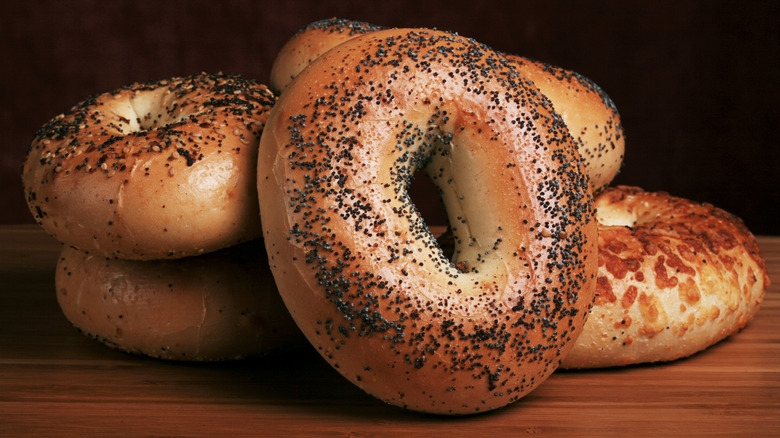Are Scooped Bagels More Nutritious Than Regular Ones?
The chewy bagel is the breakfast choice of many. To cut calorie corners without sacrificing the whole meal, some people have resorted to "scooping" their bagels, i.e. hollowing out the doughy middle. Beyond existing as an at-home remedy for reducing calories, gluten, and carbs, you can even order scooped bagels at certain cafes in — where else? — LA. The trend has been around since at least 2018, but it became a hot-button cultural issue when a visiting Californian asked for a scooped-out bagel in a New York City eatery. As you might imagine, the reception was less than friendly. However you feel about that controversy, it does beg the question: Are scooped bagels more nutritious than traditional ones?
The answer lies in the slippery qualifier, "nutritious." Even if something is lower in calories, that doesn't necessarily mean it's nutritious. Carbs and gluten aren't the only deciding factors in the healthiness of a food. Sugar, fat, sodium, and protein levels are all equally important. If you scoop your bagel, you can rely on the fact that you'll roughly be cutting down your carbohydrates and calories in half, but what else are you removing when you toss out this starchy filler? And, just as important, what are you adding back in? Depending on the answer to these two questions, your scooped bagel may be significantly less nutritious than an untouched one.
Cutting calories or nutrition?
First, consider what kind of bagel you're selecting. If it's an Asiago bagel or a brown-sugar brûlée bagel, chances are that a lot of the calories are piled on top of the bagel, limiting the effectiveness of your hollowing-out treatment by maintaining the excess sugar or fat on top.
Next, think about what other things you're sacrificing when removing the interior of your bagel. Sure, you're ditching half the calories, but you're also getting rid of half the protein (about 14 grams down to 7 grams) and fiber as well. This is especially true if your bagel of choice is made with whole grains, like rye or spelt. Whole grain bagels pack more vitamins, dietary fiber, and nutrients than processed white flour. If you get rid of that interior, you're dumping whatever Vitamin B, iron, selenium, and magnesium the whole grain bagel is packing.
Finally, there's the problem of bagel fillings. As mentioned by the Californian TikToker who ordered the scooped bagel, he liked to fill his scooped bagel with plenty of cream cheese for his ideal ratio of filling to bagel. Cream cheese ups the fat and calorie intake (one ounce adds a hundred calories and 10 grams of fat) of the scooped bagel considerably. Butter has the same effect. Long story short? A scooped bagel may promise fewer carbs and calories initially, but it doesn't make the baked goods more nutritious.


